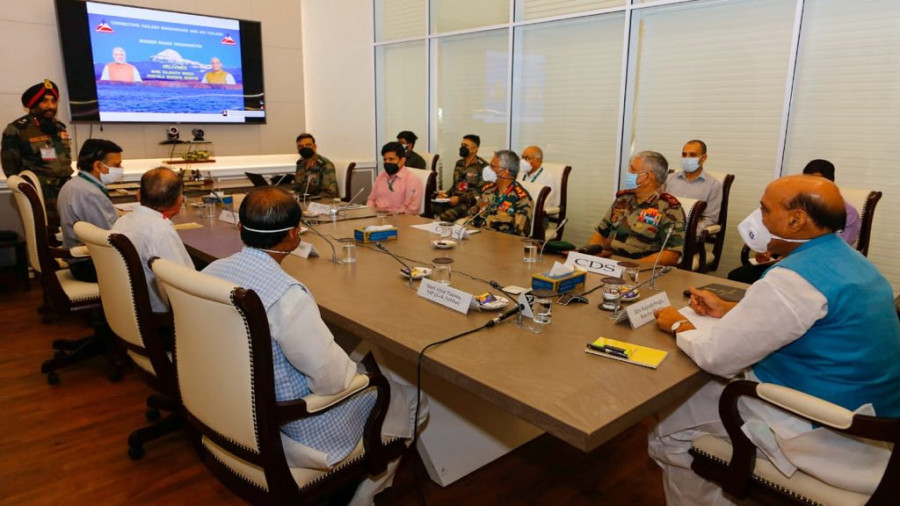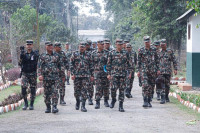National
India opening a road via Lipulekh, a territory that Nepal claims, is a diplomatic failure
Despite the furore in Kathmandu over the inclusion of Kalapani on a new Indian map, the government has done little to reclaim lands that Nepal claims as its own.
Anil Giri
Back in November, India’s inclusion of Kalapani within its territory on a new political map had created an uproar in Nepal and left Kathmandu scrambling for a response. Six months later, with no real progress from the Nepali side, New Delhi, on Friday, announced the opening of a road link in Uttarakhand’s Pithoragarh via the Lipulekh pass, another disputed area.
At a time when boundary disputes with India vis-a-vis Kalapani and Susta remain, the opening of a road through Lipulekh is an outcome of Kathmandu’s spectacular failure on the diplomatic front, say foreign policy analysts.
Lipulekh is a strip of land on the northwestern edge of Nepal, lodged between Nepal, India and Tibet. While some call it a tri-junction between these three countries, Nepal has been claiming the southern part of the pass and has refused to recognise it as a tri-junction.
During the visit of Chinese Premier Li Keqang to India in May 2015, India and China had agreed to open and expand the border points at Nathu La, Lipulekh and Shipki La.
When India and China agreed to expand a trade route through Lipulekh pass near Kalapani, Kathmandu was caught unawares, and now India has built a road link via the disputed territory, once again surprising Nepali officials.
“We came to know that India and China were in intense talks to open three border points to link Mansarover since 2013,” said Toyanath Baral, former director-general of the Survey Department. “It would have been good if we had put pressure on India and China since then. In 2015, India and China managed to reach an agreement. Now it is too late as India has already built a road.”
According to Baral, who was involved in the last round of boundary talks with India held in 2007, Nepal only protested after the 2015 agreement was signed between India and China.
India’s Union Defence Minister Rajnath Singh inaugurated the newly built road on Friday.
“With this move, the Indian security post at Indo-China border in Vyans valley of Pithoragarh district is now connected with the rest of the country via a 75.54-km long road from Ghatibagar in Dharchula to Lipulekh near the border with China,” the Hindustan Times reported.
Two senior Nepal government officials said that they were not aware of the new development except for a briefing from the Nepali Embassy in New Delhi about the inauguration of the road section.
The Delhi mission communicated to the Ministry of Foreign Affairs on Friday, saying it is following developments, according to a diplomatic source.
“It looks like India has upgraded the section of road by blacktopping it,” said the diplomat. “We are waiting for a complete report from New Delhi. Based on that, the Foreign Ministry will take a position.”
The diplomat said that the timing of the inauguration of the road may look odd, given the pandemic, but it won’t change Nepal’s stated position on Lipulekh, Kalapani or Limpuyadhura.
“I only learned about the latest development from a media report,” said Nawaraj Dhakal, spokesperson for the Survey Department. “We don’t know more than what has been reported.”
According to Foreign Ministry officials, Foreign Secretary Shanker Das Bairagi spoke with Indian Ambassador Vinay Mohan Kwatra on Friday regarding the road, expressing Nepal’s displeasure and its principal position on the boundary dispute.
Foreign Minister Pradeep Gyawali confirmed to the Post that Nepal had taken up the matter with India, but said that he would only issue an official statement after receiving a detailed report from the Nepali Embassy in New Delhi.
After India placed Kalapani, which Nepal claims as its territory, within its territory on a new government map in November, the Nepal government had formed two committees, headed by the joint secretaries of the India and China desks at the Foreign Ministry, to conduct field visits and prepare a status report on the border. The committee surveying the border with India has completed its visit but the committee that was supposed to study the China border had yet to start its work when the Covid-19 pandemic hit.
From Prime Minister KP Sharma Oli to Foreign Minister Gyawali, along with other ministers as well as top leaders of the ruling party, had all vowed to reclaim the disputed tract of land after the Kalapani issue emerged. But not a single round of talks has taken place in the last six months.
In February last year, long before the Kalapani issue reemerged, Foreign Minister Gyawali had told a House committee that India and China “cannot discuss Lipulekh in Nepal’s absence.” Gyawali told the Parliamentary International Relations Committee that the Nepal government does not accept Lipulekh as a tri-junction between Nepal, India and China.
He had also said that the Nepal government would not sign the 182 strip maps proposed by India, unless the issues surrounding Kalapani and Susta were resolved.
In 2007, India had come up with 182 strip maps between Nepal and India which excluded Susta and Kalapani.
Back in 2017, when India and China had a standoff over Doklam, experts in Nepal had advised that Nepal raise its border issues with both countries to avoid any friction between the neighbouring countries.
But Nepal failed to take any initiative, and India in November last year reinforced its claim by issuing a political map that placed Kalapani, Lipulekh pass and Limpiyadhura inside its territory.
Nepal protested through diplomatic channels and offered to hold talks with India at the Foreign Secretary level to settle the row. But there has been no progress yet.
“This is the failure of successive governments,” said Dinesh Bhattarai, who served as foreign relations advisor to former prime minister Sushil Koirala during whose tenure India and China signed the deal to expand the trade route via Lipulekh.
According to Bhattarai, the Koirala government had immediately taken up the issue with both India and China.
“Since then we have had dozens of visits from either side, but we never raised the issue of land encroachment,” Bhattarai told the Post. “Our land is being encroached upon, but this government, which never tires of talking about nationalism, has no idea.”




 8.44°C Kathmandu
8.44°C Kathmandu














